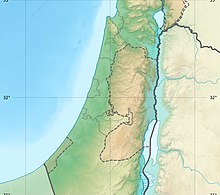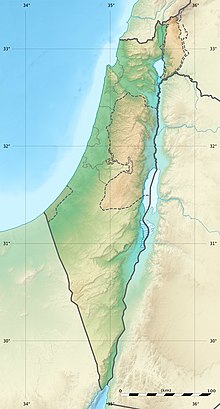| Revision as of 22:48, 27 February 2022 editDWAtwood (talk | contribs)1 editm →References: Added the total of fighting men from Numbers 1. Joshua 4:13 is only referencing the men who came from the tribe of Reuben, Gad, and 1/2 tribe of Manasseh. Therefore biblically the number is much higher.Tags: Reverted Visual edit← Previous edit | Revision as of 05:24, 1 March 2022 edit undoRoyce Rufer (talk | contribs)50 edits Undid revision 1074370566 by DWAtwood (talk) original researchTags: Undo references removedNext edit → | ||
| Line 1: | Line 1: | ||
| {{Short description|Legendary battle fought by the Israelites during their conquest of Canaan}} | {{Short description|Legendary battle fought by the Israelites during their conquest of Canaan}} | ||
| {{Infobox military conflict | {{Infobox military conflict | ||
| | conflict |
| conflict = Battle of Jericho (biblical) | ||
| | image |
| image = JSC the battle of Jericho.png | ||
| | caption |
| caption = Depiction by ] (1794–1872) | ||
| | place |
| place = ] (biblical Jericho) | ||
| | coordinates |
| coordinates = {{WikidataCoord|display=it}} | ||
| | map_type |
| map_type = West Bank relief#Israel | ||
| | map_relief |
| map_relief = yes | ||
| | map_size |
| map_size = | ||
| | map_marksize |
| map_marksize = | ||
| | map_caption |
| map_caption = | ||
| | map_label |
| map_label = | ||
| | map_mark |
| map_mark = | ||
| | casus = | |||
| | |
| territory = | ||
| | |
| result = Hebrew victory | ||
| | combatant1 = ] | |||
| | result = Hebrew victory | |||
| | |
| combatant2 = ] | ||
| | |
| commander1 = ] | ||
| | |
| commander2 = King of Jericho ] | ||
| | strength1 = 40,000<ref>{{bibleverse |Joshua|4:13|KJV}}</ref> | |||
| | commander2 = King of Jericho ] | |||
| ⚫ | | strength2 = Unknown | ||
| | strength1 = 535,300 total<ref>{{bibleverse |Joshua|4:13|KJV}}</ref><ref>{{bibleverse |Numbers|1|KJV}}</ref> 40,000 from Reuben, Gad, 1/2 tribe of Manasseh of a possible 108,250. 495,300 from Simeon, Judah, Isaachar, Zebulun, Ephraim, 1/2 tribe of Mannasseh, Benjamin, Dan, Asher, & Naphtali | |||
| ⚫ | | casualties1 = Nil | ||
| ⚫ | | strength2 |
||
| ⚫ | | casualties2 = ] of all inhabitants (excluding ] and her family). | ||
| ⚫ | | casualties1 |
||
| ⚫ | | casualties2 |
||
| }} | }} | ||
| {{Campaignbox Early Israelite campaigns}} | {{Campaignbox Early Israelite campaigns}} | ||
Revision as of 05:24, 1 March 2022
Legendary battle fought by the Israelites during their conquest of Canaan| Battle of Jericho (biblical) | |||||
|---|---|---|---|---|---|
 Depiction by Julius Schnoor von Carolsfeld (1794–1872) | |||||
| |||||
| Belligerents | |||||
| Israelites | Canaanites | ||||
| Commanders and leaders | |||||
| Joshua | King of Jericho † | ||||
| Strength | |||||
| 40,000 | Unknown | ||||
| Casualties and losses | |||||
| Nil | Massacre of all inhabitants (excluding Rahab and her family). | ||||
  | |||||
| The Bible and warfare | ||||||||||||
|---|---|---|---|---|---|---|---|---|---|---|---|---|
| Hebrew Bible battles |
|  | ||||||||||
| Bible Portal | ||||||||||||
The Battle of Jericho is an incident from the Book of Joshua, being the first battle fought by the Israelites in the course of the conquest of Canaan. According to Joshua 6:1–27, the walls of Jericho fell after the Israelites marched around the city walls once a day for six days and seven times on the seventh day then blew their trumpets. Excavations at Tell es-Sultan, the biblical Jericho, have failed to substantiate this story, which has its origins in the nationalist propaganda of much later kings of Judah and their claims to the territory of the Kingdom of Israel. The lack of archaeological evidence and the composition, history and theological purposes of the Book of Joshua have led archaeologists like William G. Dever to characterise the story of the fall of Jericho as "invented out of whole cloth".
Biblical account
The Book of Joshua is the story of how Israel conquered Canaan. Joshua, the leader of the Israelites, sent two spies to Jericho, the first city of Canaan that they decided to conquer, and discovered that the land was in fear of them and their God. The Israelites marched around the walls once every day for six days with the priests carrying the Ark of the Covenant. On the seventh day they marched seven times around the walls, then the priests blew their ram's horns, the Israelites raised a great shout, and the walls of the city fell. Following God's law they killed every man and woman of every age, as well as the oxen, sheep, and donkeys. Only Rahab, a Canaanite prostitute who had sheltered the spies, her parents, brothers and all "those who belonged to her" were spared. Joshua then cursed anybody who rebuilt the foundations and gates, with the deaths of their firstborn and youngest child respectively. This was eventually fulfilled by Hiel the Bethelite under King Ahab's reign.
Origins and historicity

In 1868, Charles Warren identified Tell es-Sultan as the site of Jericho. In 1930–1936, John Garstang conducted excavations there and discovered the remains of a network of collapsed walls which he dated to about 1400 BCE. Kathleen Kenyon re-excavated the site over 1952–1958 and demonstrated that the destruction occurred at an earlier time, during a well-attested Egyptian campaign against the Hyksos of that period, and that Jericho had been deserted throughout the mid-late 13th century BCE, the supposed time of Joshua's battle. Sources differ as to what date Kenyon instead proposed; either c. 1500 BCE or c. 1580 BCE. Kenyon's work was corroborated in 1995 by radiocarbon tests which dated the destruction level to the late 17th or 16th centuries BCE. A small unwalled settlement was rebuilt in the 15th century BCE, but the tell was unoccupied from the late 15th century until the 10th/9th centuries BCE.
Scholars agree almost unanimously that the Book of Joshua holds little historical value. Its origin lies in a time far removed from the times that it depicts, and its intention is primarily theological in detailing how Israel and her leaders are judged by their obedience to the teachings and laws (the covenant) set down in the Book of Deuteronomy. The story of Jericho and the rest of the conquest represents the nationalist propaganda of the Kingdom of Judah and their claims to the territory of the Kingdom of Israel after 722 BCE; those chapters were later incorporated into an early form of Joshua likely written late in the reign of King Josiah (reigned 640–609 BCE), and the book was revised and completed after the fall of Jerusalem to the Babylonians in 586, and possibly after the return from the Babylonian exile in 538.
See also
- Ai (Bible)
- Biblical archaeology
- "Joshua Fit the Battle of Jericho", African-American spiritual about the battle
References
- Joshua 4:13
- ^ Jacobs 2000, p. 691.
- ^ Coote 2000, p. 275.
- Dever 2006, p. 47.
- Wagemakers 2014, pp. 122ff.
- ^ Dever 2006, pp. 45–46.
- ^ Bruins & van der Plicht 1995, p. 213.
- Killebrew 2005, p. 152.
- Creach 2003, pp. 9–10.
- Laffey 2007, p. 337.
- Creach 2003, pp. 10–11.
Bibliography
- Bruins, Hendrik J.; van der Plicht, Johannes (1995). "Tell Es-Sultan (Jericho): Radiocarbon Results…" (PDF). Radiocarbon. 37 (2). Proceedings of the 15th International ¹⁴C Conference: 213–220. doi:10.1017/S0033822200030666.
- Coote, Robert B. (2000). "Conquest: Biblical narrative". In Freedman, David Noel; Myers, Allen C. (eds.). Eerdmans Dictionary of the Bible. Eerdmans. ISBN 9789053565032.
- Creach, Jerome F.D. (2003). Joshua. Westminster John Knox Press. ISBN 9780664237387.
- Dever, William G. (2006). Who Were the Early Israelites and Where Did They Come From?. Eerdmans. ISBN 9780802844163.
- Jacobs, Paul F. (2000). "Jericho". In Freedman, David Noel; Myers, Allen C. (eds.). Eerdmans Dictionary of the Bible. Eerdmans. ISBN 9789053565032.
- Killebrew, Ann E. (2005). Biblical Peoples and Ethnicity: An Archaeological Study of Egyptians, Canaanites, and Early Israel, 1300–1100 B.C.E. Society of Biblical Literature. ISBN 9781589830974.
- Laffey, Alice L. (2007). "Deuteronomistic history". In Espín, Orlando O.; Nickoloff, James B. (eds.). An introductory dictionary of theology and religious studies. Liturgical Press. ISBN 9780814658567.
- Moore, Megan Bishop; Kelle, Brad E. (2011). Biblical History and Israel's Past. Eerdmans. ISBN 9780802862600.
- Wagemakers, Bart (2014). Archaeology in the 'Land of Tells and Ruins': A History of Excavations in the Holy Land Inspired by the Photographs and Accounts of Leo Boer. Oxbow Books. ISBN 978-1-78297246-4.
External links
 Media related to The Battle of Jericho at Wikimedia Commons
Media related to The Battle of Jericho at Wikimedia Commons